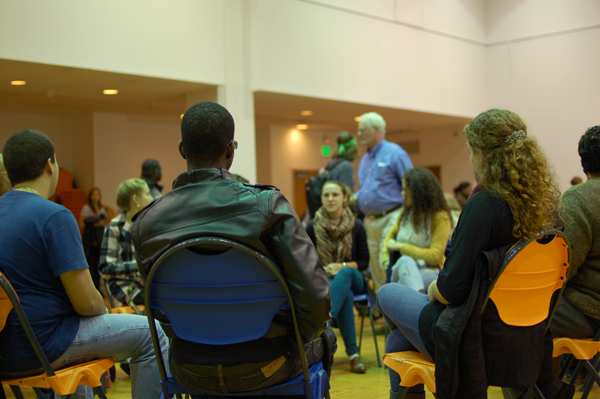

SUNY New Paltz administrative and student leaders hosted a forum last week in response to the racial incidents that took place on campus nearly one month ago.
College President Donald Christian and Student Association President Terrell Coakley sponsored the forum entitled, “Can We Talk About It? A campus discussion about race and racial equity.” It was held on Nov. 30 in various rooms throughout the Student Union from 6 to 8 p.m and culminated in the Multipurpose Room.
Christian said he hoped the forum would prove to be an important event in the life of the college and the community would be able to begin healing the wounds caused by the incidents. He said he hopes this begins to address issues of race and racial equity as well as other issues of equity that the community may see.
University Police officials said one of the incidents occured on Nov. 8, when a sign reading “colored only” was found above a fountain in the Humanities Building, was one of the reasons the discussion took place. Christian said this incident is still under active investigation.
Although the incident was a large part of the conversation, students, faculty and staff in attendance were asked to discuss their feelings on six different questions in small groups of 15-25 people. The questions were as folows: “how did the incidents make you feel, beyond this incident how does racism manifest itself, what does racism mean to you, has anyone ever made an assumption of you based on your race, have you ever made an assumption based on someone’s skin color and does the color of your skin dictate your potential in life?”
“We need to think about how we perpetuate hate in ourselves and think about what we can do,” said Chanel Ward, Black Studies adjunct professor and resident director of Bouton Hall. “We need to find out why we are fearful and why you are uncomfortable to support human-to-human emotion.”
After hearing different opinions voiced and meeting new people, attendees were encouraged to smile and say hello to the people they met. Coakley said he hopes people could possibly feel comfortable enough to talk about these issues in the future.
Second-year sociology major Emily Wever said she thought this was an excellent idea. She said the most comforting aspect of the forum was knowing others on campus feel the same way she does and that an open mind is important.
Participants said they believed that this type of discussion was necessary and being in small groups allowed people to speak candidly about difficult topics.
Some students said they felt they didn’t have enough time to talk about their topics. Third-year Black Studies major Jada Young said her group didn’t finish answering all of the questions and more time was required to get to the core of the subjects.
“We need more discussions among faculty and this needs to be reflected in faculty and student relationships too,” said Young.
Some participants said they believed the forum is the first step toward increasing awareness on the topics of racism and for fostering a greater sense of community at New Paltz.
“It’s really important to raise issues and to raise consciousness,” said Abigail Robin, a retired Women Studies professor. “All of us, first of all, are human and this is about human rights.”
Even though the forum created a platform for discussion to begin, others still feel that there is a lot of progress to be made.
“I’m fearful about the people who didn’t come,” said Wever. “I know we are all open-minded [at the forum], but the people that posted those signs probably weren’t here.”
Others agreed with Wever, saying the forum only reached people that were willing to change or at least speak about the topics at hand. Young said the topics were good, but it was like preaching to the choir.
In the future, Coakley said he hopes to have other forums on different topics such as gender of homophobia because the topic cannot be addressed without recognizing other issues at hand.
Coakley said speaking up and having discussions on more and more topics is necessary to combat all injustices.
“Until we hear about each other, we can’t care about each other,” said Coakley.
